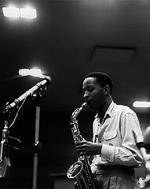Frank Morgan almost made it to 74. A lot of people weren't sure he'd reach 24. But the alto sax preserved him. He had too much music in him to die.
Heroin addiction stood in the way, from Morgan's teenhood onward. Long stretches in prison could have killed his spirit, except most of the time he was allowed to play his horn. (He had a band with Art Pepper in San Quentin.) He cleaned up and made a celebrated comeback in the '80s. After a 1998 stroke virtually crippled him, he worked double-hard on physical therapy till he got all his chops back -- he just wanted to play again. Kidney failure couldn't stop him. Colon cancer finally took the sax out of his hands December 14.
Morgan was so, so good. When he made his first recordings in 1955, the year Charlie Parker died, observers looked to him as a prime carrier of Bird's line, and that music said yeah. Backed by the Cuban rhythms of Machito and paired with no less a tenor foil than Wardell Gray (on Gray's final date before being murdered), Morgan spieled clean, fluid, joyful bop lines broken into sweet bite-size phrases. But most important was his sound.
Even more than the Kansas City-bred Parker, Morgan, born (and died) in Minneapolis but schooled in Los Angeles under Sam Browne at Jefferson High, was a blues player. His soft, sliding cry felt as if you'd been hearing it forever -- but where? Parker's pain was more internal. Art Pepper was less inflected, less emotional. Benny Carter had a swingster's urbane polish and remove. Sonny Criss, though equally sensitive, blew with more swagger.
Morgan had his own thing. He was delicate. When he gently bent those blues notes, you could hear tears. And the sound fit his personality. Small in stature, light of bone, he stood like a child, eyes wide, smiling just a little, as if not sure he would be accepted. When people applauded, he seemed genuinely grateful.
They applauded a lot, though not always at the right times. I saw five of his performances, and only three met his standards. The first was in the late '80s, not long after he'd flown the slammer for the last time, and he was bebopping his head off. Next was in the early '90s, at the peak of his recognition; he was doing a lot of ballads, playing "When You Wish Upon a Star" with such wan fragility that I thought he was back on the smack. In 1994 he staged a duo with his old friend Horace Tapscott on piano, and it was a disaster; he seemed completely disoriented as fragments of bop standards leaked at random from his horn. (He told me years later, "I was feeling pretty weird. I really regret that. I didn't think Horace and I should have done that to begin with.") In 2003, he careened through the jazz tradition as he fronted a band in tandem with fellow saxist Sonny Fortune -- wild gale-force gusts and a lot of fun.
The last time was in 2005. I was writing a story on original bop pianist Freddie Redd, who agreed to go with me to see Morgan lead an ensemble featuring bassist John Clayton at Catalina's. Redd and Morgan knew each other from way back, so I suggested that Redd, a very shy fella, go say hello to Morgan between sets. Morgan ignored him. Or maybe he didn't see him, though Redd's trademark Panama hat is hard to miss. It seemed strange, but I don't know the personal history. Anyway, Morgan was playing beautifully, both on boppers and standards. Not a trace of damage remained from the stroke.
The live shows are what I will remember. They're the way an audience truly relates to an artist -- good and bad, and it's not real any other way. He let us see him as a musician and a human being, knowing he would be judged. That must have been hard. But he also must have known he was one of the best.
PHOTO BY DAVID D. SPITZER

